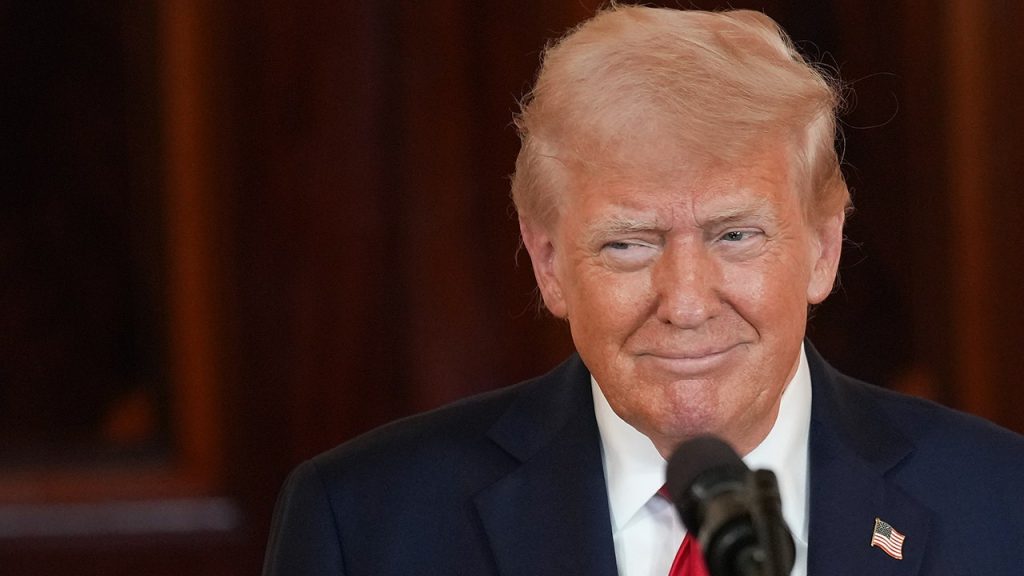In a recent interview, President Donald Trump reiterated his firm stance on maintaining tariffs against China as a strategic move in ongoing trade negotiations. He emphasized that tariffs will remain in place as leverage until a favorable agreement is reached. Trump’s comments reflect his view that China’s current economic turmoil is not a sufficient reason to lift these sanctions, as doing so would benefit the Chinese economy at the expense of U.S. interests. This comprehensive dialogue revolves around the complexities of international trade and its implications for both nations.
| Article Subheadings |
|---|
| 1) The President’s Tariff Stance |
| 2) Economic Impacts of Tariffs |
| 3) China’s Response to U.S. Tariffs |
| 4) Predicted Economic Outcomes |
| 5) Long-term Trade Relations |
The President’s Tariff Stance
President Donald Trump addressed this critical issue during an interview on NBC’s “Meet The Press,” recorded on his Mar-a-Lago estate. Trump firmly stated, “No” when questioned about dropping tariffs as an incentive for China to enter negotiations. He expressed that he does not want to allow China to benefit excessively while the U.S. faces economic challenges. Specifically, Trump noted, “They said today they want to talk… China’s getting absolutely destroyed.” This statement highlights Trump’s perspective that maintaining tariffs is essential for protecting U.S. interests.
Economic Impacts of Tariffs
The tariffs imposed on China have led to significant economic implications both domestically and internationally. Trump claimed that the Chinese economy is struggling, with factories closing and unemployment rising. This assertion suggests that the tariffs are negatively impacting not only American businesses but also the global economic landscape. Trump’s comments aimed to reassure Americans, stating that while China suffers, U.S. companies are thriving off the tariff strategy. He pointed to large corporations like Apple, Toyota, and General Motors that have redoubled their commitment to American manufacturing amid these tariffs.
China’s Response to U.S. Tariffs
In response to the ongoing trade disputes, the Chinese government has reportedly taken steps to mitigate the effects of tariffs on U.S. goods. Recent reports indicate that China is compiling a list of American products to exempt from its hefty tariffs, which currently stand at around 125%. Exemptions have been observed for some pharmaceuticals, microchips, and aircraft engines, reflecting China’s strategic moves to insulate its economy from the full brunt of U.S. tariffs. This scenario sets the stage for a complex dialogue between the two superpowers as they navigate through the ramifications of these tariffs and their broader economic relations.
Predicted Economic Outcomes
While many experts express concern over the potential for a recession linked to these trade tensions, Trump remains optimistic about America’s economic future. During the interview, he suggested that the U.S. is going through a transitional phase and reassured viewers of a forthcoming “greatest economic boom in history.” He acknowledged the possibility of entering a recession but dismissed immediate worries, stating, “Look, yeah. Everything’s okay.” Trump’s perspective counters conventional economic analyses, which warn about the long-term consequences of his trade policies and their effects on economic stability.
Long-term Trade Relations
The future of U.S.-China trade relations hinges significantly on both countries’ willingness to negotiate. Trump’s insistence on maintaining tariffs until a satisfactory deal is reached implies a strategic game of negotiations that may prolong trade tensions. While trade agreements often encompass more than just tariffs, such as labor laws and intellectual property rights, Trump’s administration appears focused on leveraging tariffs to compel China’s compliance. This approach could have lasting implications for America’s global economic standing and its relationships with allies and trading partners.
| No. | Key Points |
|---|---|
| 1 | Trump refuses to drop tariffs as leverage in trade talks with China. |
| 2 | China’s economy is reportedly suffering due to the ongoing tariffs. |
| 3 | Trump highlights the benefits for larger American businesses under his tariff regime. |
| 4 | China is considering exemptions for critical American products. |
| 5 | The future of trade relations is uncertain as negotiations continue. |
Summary
In summary, President Donald Trump’s unyielding stance on tariffs against China highlights the complexities of modern trade negotiations. By emphasizing the economic challenges facing China, Trump appears to be reaffirming his position as a negotiator unwilling to compromise on what he believes to be crucial for U.S. economic interests. As both countries continue to navigate through this tumultuous economic landscape, the outcomes of these discussions will have long-lasting implications not only for U.S.-China relations but also for the global economy as a whole.
Frequently Asked Questions
Question: What are the current tariffs imposed by the U.S. on China?
The U.S. has imposed tariffs on various Chinese goods, with some as high as 125%, particularly on products where China has a competitive edge.
Question: Why does Trump refuse to drop the tariffs?
Trump believes that maintaining tariffs is essential for leveraging negotiations with China and ensuring U.S. economic interests are protected.
Question: What implications do these tariffs have on American businesses?
While tariffs can hurt some sectors, Trump’s administration claims that larger corporations are significantly benefiting and investing in U.S. production as a direct result of the tariff policy.


